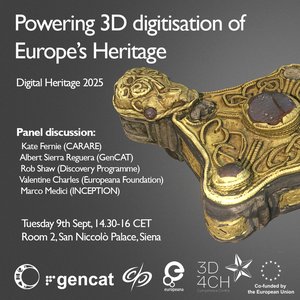
Part of Digital Heritage 2025, the panel will bring together experts to reflect on the diverse approaches and experiences across Europe in implementing 3D digitisation.
Speakers: Kate Fernie (CARARE); Albert Sierra Reguera (Agència Catalana del Patrimoni Cultural), Rob Shaw (Discovery Programme), Valentine Charles (Europeana), Marco Medici (INCEPTION).
Aimed at policymakers, cultural heritage professionals, and digital practitioners, the session offers insights into how different actors are addressing key challenges such as data capture, infrastructure, standards, skills development, and reuse. By sharing methodologies and lessons learned, the panel supports informed dialogue around scalable, sustainable solutions for advancing 3D digitisation within the cultural heritage sector. Perspectives include:
The Giravolt programme is an initiative by the Catalan Ministry of Culture involving museums and organisations involved in heritage from across Catalunya. Giravolt takes a collaborative approach involving different disciplines and covers the entire chain of cultural work, from documentation and conservation to final dissemination and reuse. Its objectives are to create a digital body of resources creating greater accessibility to Catalonian heritage, establish standards, promote reuse of 3D models for education, support collaboration with other 3D professionals, and document the current state of Catalan heritage.
The Discovery Programme is Ireland’s national centre for Archaeology and Innovation. As part of its remit to enhance understanding of Ireland’s past through research programmes, the Discovery Programme documents archaeology and the wider cultural heritage digitally. 3D scanning and other remote sensing techniques are used to produce digital replicas for a range of uses from conservation and preservation, in-depth analysis as well as communicating cultural value to the public.
TwinIt!, a joint campaign by the European Commission and the Europeana Initiative to mobilise all EU Member States to submit at least one 3D-digitised heritage asset to the Data Space by June 2024. The aim was to create a showcase of high-quality examples of Europe’s cultural assets in 3D, while at the same time building national capacity for 3D digitisation efforts. Individual Member States engaged in interesting discussions to select which heritage assets to offer up as 3D models to the showcase and to define their workflows (from personnel, capture techniques, equipment, storage infrastructure, hosting platforms to metadata and licences). The experience of the TwinIt! Campaign has inspired further work on 3D digitisation, training, reuse and capacity building. Further work is currently underway within the Data Space and the EU-funded supporting projects to encourage, which are enabling and promoting the use and re-uses of 3D in cultural heritage.
INCEPTION is an innovative start-up company established at the University of Ferrara as a spin-off following the EU-funded INCEPTION project (https://www.inceptionspinoff.com). The company has experiences of the evolution of 3D digitisation in the cultural heritage sector, advanced skills in the digitization of the built environment, the use of BIM technologies and semantic-web platforms for the Cultural Heritage. It also has knowledge of the emergence of new solutions (such as AI and XR) and digital tools and their potential for boosting cultural institutions’ ability to make effective use of their 3D digital assets. INCEPTION participated in the 4CH project and currently coordinates the EU-funded 3D-4CH project. 3D-4CH is working to establish an online competence centre for 3D heritage, which has as a key objective building capacity to support the creation and deployment of 3D heritage objects within the European data space.
Workshop format
The workshop is planned for two hours.
Following an introduction by the moderator, each panel member will give a 15-minute presentation sharing their experiences, progress so far (the difficulties faced and positive results) and perspective. This will be followed by a panel discussion with questions from the panel’s moderator and a Q&A session with the audience designed to explore the challenges and opportunities for cultural heritage institutions as they attempt to meet the ambitious targets set by the EC directive both for digitisation and for sharing 3D assets with the Europeana Initiative and Common Data Space for Cultural Heritage.